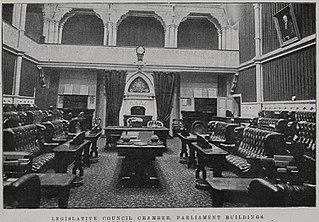
The New Zealand Parliament is the legislature of New Zealand, consisting of the Queen of New Zealand (Queen-in-Parliament) and the New Zealand House of Representatives. The Queen is usually represented by a governor-general. Before 1951, there was an upper chamber, the New Zealand Legislative Council. The Parliament was established in 1854 and is one of the oldest continuously functioning legislatures in the world.

Sir James Allen was a prominent New Zealand politician and diplomat. He held a number of the most important political offices in the country, including Minister of Finance and Minister of Foreign Affairs. He was also New Zealand's Minister of Defence during World War I.
The 1st New Zealand Parliament was a term of the Parliament of New Zealand. It opened on 24 May 1854, following New Zealand's first general election. It was dissolved on 15 September 1855 in preparation for that year's election. 37 Members of the House of Representatives (MHRs) represented 24 electorates.

Sir Francis Dillon Bell was a New Zealand politician of the late 19th century. He served as New Zealand's third Minister of Finance, and later as its third Speaker of the House. The town of Bell Block near New Plymouth – on land Bell bought from the Puketapu iwi in 1849 – is named after him, as is Bell Street, Whanganui. Bell's son, Francis Henry Dillon Bell, became the first New Zealand born Prime Minister in 1925.

Ministers, in the New Zealand Government, are members of Parliament who hold ministerial warrants from the Crown to perform certain functions of government. This includes formulating and implementing policies and advising the governor-general. Ministers collectively make up the executive branch of the New Zealand state. In practice, the governor-general is obliged to follow the advice of the prime minister on the appointment and dismissal of ministers.

Sir Frederick Whitaker was an English-born New Zealand politician who served twice as the Prime Minister of New Zealand and six times as Attorney-General.

Henry John Tancred was a 19th-century New Zealand politician.

Sir Christopher James Parr was a New Zealand lawyer and politician of the Reform Party. He was Mayor of Auckland, a Member of Parliament representing the Eden electorate, a Minister in the Reform Government, High Commissioner in London and a Member of the New Zealand Legislative Council.

Arthur Penrose Seymour was a 19th-century New Zealand politician from Picton. He was the 4th Superintendent of the Marlborough Province and was a member of the provincial government for all 16 years of its existence. With his strong advocacy for Picton, he successfully had the Seat of Government moved to Picton. When the Blenheim party secured a majority in the Provincial Council by 1865, Seymour negotiated the removal of the Seat of Government back to Blenheim.

The Sewell Ministry was the first responsible government in New Zealand. It formed in 1856, but lasted only one month, from 18 April to 20 May. From 7 May onwards, Henry Sewell was Colonial Secretary, considered to be the equivalent of Prime Minister. Thus, Sewell became the first Prime Minister of New Zealand.

The 29th New Zealand Parliament was a term of the Parliament of New Zealand. It opened in 1950, following the 1949 general election. It was dissolved in 1951 in preparation for the 1951 general election. The governing Labour Party had been defeated in the election by the National Party. This marked the end of the First Labour government and the beginning of the First National government.
Cyril Hendry Croker (1888–1958) of New Plymouth was appointed a member of the New Zealand Legislative Council on 27 July 1950.
Cheviot Wellington Rangi Dillon Bell of the Wairarapa was appointed a member of the New Zealand Legislative Council in 1950 as part of National's suicide squad.

Andrew Henson Allen was Mayor of Dunedin and a member of the New Zealand Legislative Council.
Leonard Allen Alexander (1904–1968) of Waitara was appointed a member of the New Zealand Legislative Council on 22 June 1950.

James Roberts was a New Zealand trade unionist, politician and was president of the Labour Party from 1937 to 1950. He was called 'Big Jim' and 'the uncrowned King of New Zealand' in recognition of the considerable influence he wielded during the period of the First Labour Government over policy creation and implementation.

The 1865 Town of New Plymouth by-election was a by-election held in the Town of New Plymouth electorate during the 3rd New Zealand Parliament, on 19 May 1865. The by-election was caused by the resignation of the incumbent, Charles Brown, and was won unopposed by Henry Sewell. Whilst Sewell was not a local resident, he was a member of the government through his appointment to the Legislative Council, the upper house of Parliament. Sewell accepted the invitation to represent the electorate, as him becoming a member of the lower house was seen to strengthen the government.












